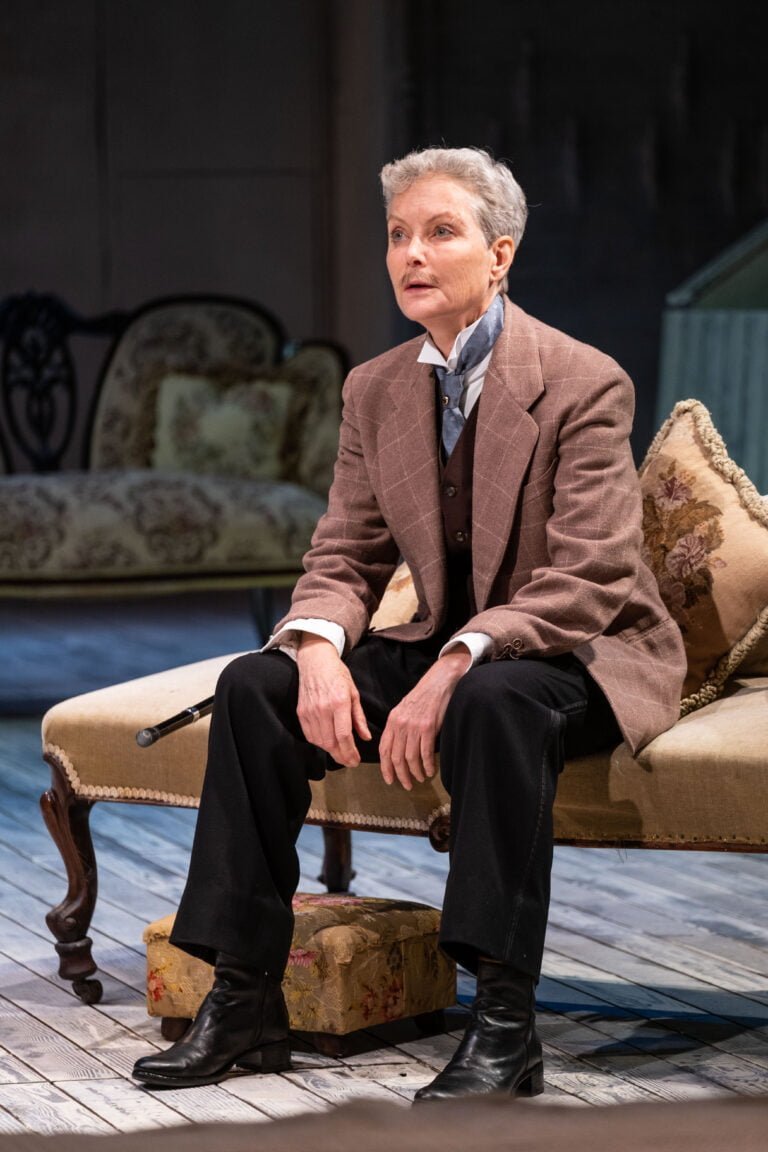Sean Mathias's Cherry Orchard disappoints
“All Russia is our orchard.”
Trofimov

In this last of Chekhov’s four great plays, more than any of the others is the portrayal of Russia, ripe for a regime change with a new thrusting intelligentsia in conflict with the old land-owning class. The cherry orchard loses its economic viability when there are no longer any serfs to pick the cherries.
However, when Chekhov was asked what The Cherry Orchard was about he said, Act One: they are wondering whether they will have to sell the cherry orchard; Act Two: they are going to sell the cherry orchard; Act Three: the cherry orchard is sold; Act Four: what they do after the cherry orchard is sold. This story may be apocryphal but I like its “matter of factness.”.
Lopakhin (Martin Shaw) the descendant of serfs is there first onstage in The Cherry Orchard. Some of the servants have gone to meet the train carrying the family. The house is looking rather worse for wear, the French windows have a pediment and are painted blue but the walls behind show all the pipework. Upholstered chairs with Queen Anne legs are gathered in what was the nursery of the old house. There are again two banks of bleacher seats onstage of audience to watch this play in close up which can distract.
Commotion greets the arrival of the carriages carrying Madame Ranyevskaya (Francesca Annis) and her family. There are leather suitcases, trunks and hat boxes. The aged Russian servant Firs (Ian McKellen, playing a man five years older than his actual age) is seen with hairy dundrearies and a bald head but in formal wear.
Lopakhin will do an imitation of a chicken clucking and waving his elbows but is treated with disdain by Ranyevskaya’s brother Gaev (Jenny Seagrove). Lopakhin says “Tempus Fugit” and Gaev doesn’t understand the Latin which is hard to believe considering the tutors who were employed by the ruling classes. The other thing Gaev hasn’t learnt is politeness as he comments, “There’s a terrible smell of patchouli in here.”
Ranyevskaya’s language is full of excessive sentiment, “God knows I love Russia” she intones and the poor bookcase is subjected to an ode starting “Oh my darling bookcase”. The serious issues, the mounting debt and the nonviability of the cherry orchard are ignored by her when Lopakhin suggests the orchard should be sold and summer cottages, datchas, built there.

Firs fusses round Gaev’s collar and his choice of clothes. Trofimov (Ben Allen) the tutor brings back memories for Ranyevskaya of her little boy who drowned on the estate.
Gaev is meant to be comic relief in this play which was originally described as a comedy. Gaev cannot open his mouth without putting his foot in it. I found Seagrove’s performance annoying and distracting as Gaev polishes and repolishes the silver top of his cane or continually is flapping away a fly which doesn’t trouble any of the others. This fidgeting acting is uncalled for. Making sense is Gaev zipping up his mouth when told to be quiet but what doesn’t make sense is that the zipper isn’t invented for another ten years after this play was written!
We can’t help but agree when Lopakhin tells Gaev, “You are such an old lady.”
Three men represent Russia’s past aristocracy, her intellectual future and one socially mobility and getting wealthier. Gaev is the land owning class past, in denial, Trofimov the political future and Lopakhin the entrepreneur. The hardworking past, the serving classes, is Firs who explains that the cable breaking noise heard in this play was last heard just before the serfs won their freedom and is a harbinger of something to be feared. He explains that no-one remembers how to dry the cherries to preserve them as he looks back on how the cherry orchard was profitable.
After the interval there is an extravagant ball scene with champagne and Ranyevskaya weeps while Lopakhin is drunk and boorish. The auction takes place and the whole estate is sold and they have to leave.
Sean Mathias’s production is disappointing. The Cherry Orchard has a plethora of minor characters who will confuse anyone not knowing this play. I liked Francesca Annis as the brittle and capricious Ranyevskaya and Ben Allen is powerful as Trofimov the intellectual future of Russia. McKellen is very good as Firs, stiffly lowering himself into a chair and moving slowly but this is a minor role not really worthy of a theatrical knight. I missed the blossom of the cherry trees and we need to hear more clearly the chopping of the trees and their falling as they are felled, for greater dramatic impact.
The ending of Firs left behind, locked in the deserted house as he is locked in the past and forgotten is poignant.

Production Notes
The Cherry Orchard
By Anton Chekhov
Adapted by Martin Sherman
Directed by Sean Mathias
Cast
Starring:
Ian McKellen
Francesca Annis
Martin Shaw
Ben Allen
Robert Daws
Jenny Seagrove
With:
llinos Daniel
Alis Wyn Davies
Ashley D Gayle
Alison Halstead
Nick Howard-Brown
Kezrena James
Asif Khan
Lee Knight
Missy Malek
Creatives
Director: Sean Mathias
Set Designer: Lee Newby
Costume Designer: Loren Elstein
Lighting Designer: Nick Richings
Composer and Sound Designer: Adam Cork
Fight Director: Bret Yount
Information
Running Time: Two hours and 45 minutes with an interval
Booking to 13th November 2021
Theatre:
Theatre Royal Windsor
32 Thames St
Windsor
Berkshire
SL4 1PS
Train Windsor
Reviewed by Lizzie Loveridge at the
at the Theatre Royal Windsor
on 15th October 2021

